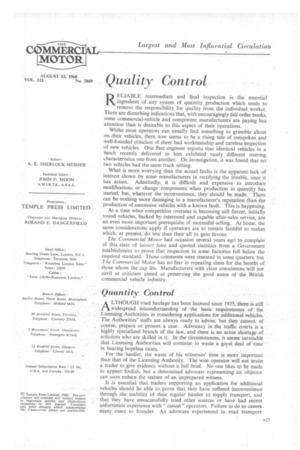Quality Control
Page 35

If you've noticed an error in this article please click here to report it so we can fix it.
RELIABLE intermediate and final inspection is the essential ingredient of any system of quantity production which tends to remove the responsibility for quality from the individual worker. There are disturbing indications that, with encouragingly full order books, some commercial-vehicle and component manufacturers are paying less attention than is desirable to this aspect of their operations.
Whilst most operators can usually find something to grumble about on their vehicles, there now seems to be a rising tide of outspoken and well-founded criticism of sheer had workmanship and careless inspection of new vehicles. One fleet engineer reports that identical vehicles in a batch recently delivered to him exhibited vastly different steering characteristics one from another. On investigation, it was found that no two vehicles had the same track setting. .
What is more worrying than the actual faults is the apparent lack of interest shown by some manufacturers in rectifying the trouble, once it has arisen. Admittedly, it is difficult and expensive to introduce modifications or change components when production in quantity has started, but, whatever the inconvenience, they should be made. There can be nothing more damaging to a manufacturer's reputation than the production of successive vehicles with a known fault. This is happening.
At a time when competition overseas is becoming still fiercer, initially sound vehicles, backed by interested and capable after-sales service, are an even more important prerequisite of successful selling. At home, the same considerations apply if operators are to remain faithful to makes which, at present, do less than their all to gain favour.
The Commercial Motor had occasion several years ago to complain of this stale of laissez faire and quoted statistics from a Government establishment to prove that inspection in some factories fell below the required standard. Those comments were resented in some quarters, but The Commercial Motor has no fear in repeating them for the benefit of those whom the cap fits. Manufacturers with clear consciences will not cavil at criticism aimed at preserving the good name of the British commercial vehicle industry.
















































































































